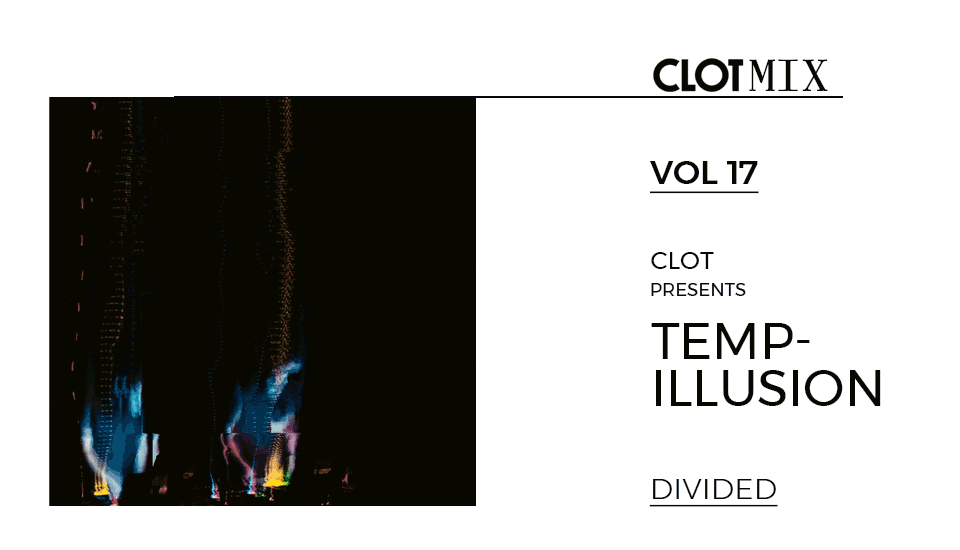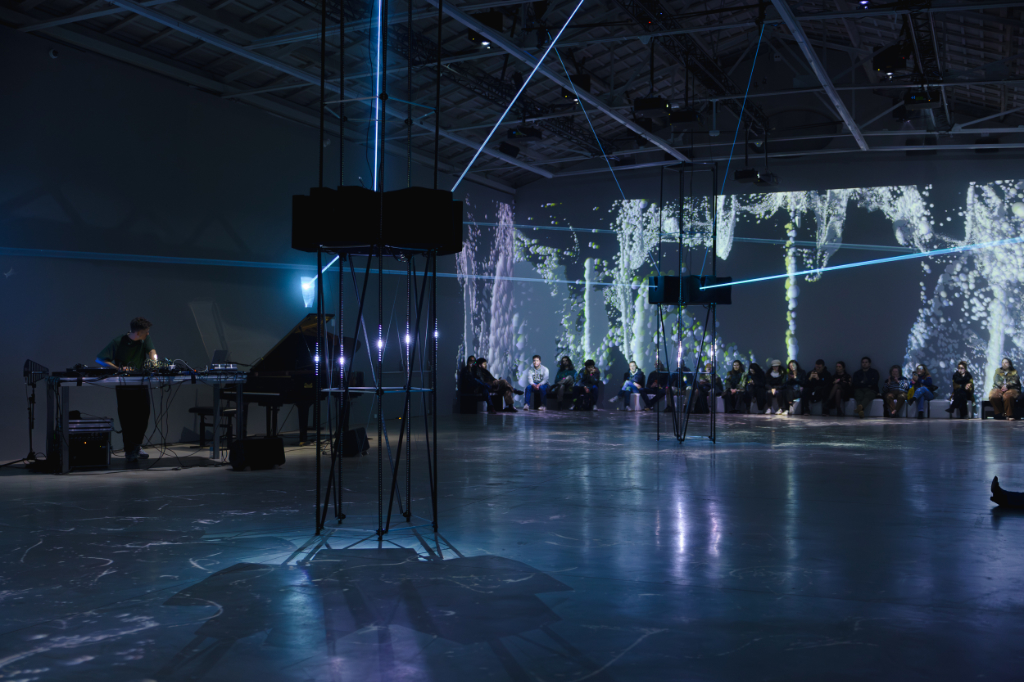Text by CLOT Magazine

Our next mixtape instalment comes from Temp-Illusion, the Iranian experimental/electronic duo consisting of Shahin Entezami and Behrang Najafi. Formed in 2011 and mainly operating as a live act, Temp-Illusion uses a wide range of music programs and hardware synthesisers in their music production to combine noisy and atmospheric layers with melodies and complex beat programming to achieve a unique style of dance music.
In recent years, an exciting Iranian electronic music scene has emerged and reached Western ears, partly thanks to the work of Sote and Zabte Sote (a sister label to Opal Tapes that focuses on putting out experimental electronic music by Iranian composers that he runs) and SET festival. Temp-Illusion released their first album Autoelected in 2019 in Zabte Sote and the more recent Pend, released earlier this year.
While Autoelected was a perfect example of what recently has become known as ‘deconstructed dance music, Pend takes it from there to evolve into an assembly of sonic microstructures that ultimately result in an artificial macro environment of hard electronic fun; taking the listener from a meditative to a hyper demented state, inspired by the fear and stress instigated by media manipulation during and after the war.
Shahin Entezami and Behrang Najafi, also have their solo projects as Tegh and Bescolour. The artists share that this mix is mostly made from the music they have recently listened to during these 2-3 months of quarantine: Since our rehearsals are also cancelled due to this pandemic, we have started to work separately on music projects, which is a new experience for us and it would probably change the way we sound! So this mix is the first output of working on a mutual project separately.
Your last album, Pend, explores the repercussion of media (visual and sound) manipulation and fake news and the impact on society manipulation, warfare, and the destruction of a country’s social structure. Particularly relevant in Iran, where you are both from. Governments have used sonic warfare for a long time, and Kode9 wrote a very insightful book about the topic. What has been your experience regarding this that made you write this album?
During the last decades, there has always been a lot of news broadcasting about the possibility of war between countries, especially Iran, and every time it has happened it has affected our lives in all aspects. During the last two years, the rate of these news/fake news grew severely, especially in Iran. We are witnessing the pressure that people here are tolerating it, economically, mentally and all other ways and we thought: isn’t it a real war? Media and their targeted news are acting like deadly weapons; even more lethal than physically real weapons concerning the breadth of people it encompasses. These fake news and manipulations have already destroyed many lives and damaged societies with the fear of war and its effect on people’s state of mind, behaviour, etc. This concern made us talk about it and turn it into an album.
What was the artistic process behind the album composition, and what did you technically explore with it?
Concerning the concept, we tried to change the way our music sounds. We made some changes to the way we designed sounds. We wanted this album to sound dirty, distorted and harsh, at first we started to manipulate some “steel” sounds which were a great help for us to get connected and realize how we both think it should sound! Most importantly, we were exploring ways we can keep our dance-ish structure when we’re talking about a grave topic that is related to human’s life. So we experienced a lot to find a proper timbre, flow, and structure which can be harsh and complex enough that can present our view on the topic and still suitable for dancing. This concern forced us to focused on more formless formats for some tracks like Caustic Surface than our previous works.
Also, Two Lands and Two Ships are a hundred per cent live recorded. We didn’t edit them that much after recording. Just a slight edit on the mix, but the whole compositions came out of jamming.
Iranian, more traditional music has very different structures and mathematics than occidental types. Has this influenced the way you approach your experimental electronic/techno compositions? And if so in what way
Iranian traditional music has not technically influenced us in the records we have made. But we are open to it and might use some Iranian elements later on some tunes. We do not like to use the “being exotic Iranians” as a tool to get famous or to get seen by the media and would love to come up with a great idea. So that might be a reason not to use Iranian elements in our music yet. Honestly, it is annoying that when people realize we are Iranians, they expect to hear Iranian traditional music come out of us. We are already annoyed by Westerns exoticizing us and would love not to get judged by being Iranian but get criticized on the music we make.
What’s the current situation of the experimental scene in Iran? For example, SET festival returned to activity this year after a few years on hold due to the particularly hard few years
Yes, as we announced it, a series of misfortunate events have happened in our country during the last two years that pushed us to pause our activity. We had planned for an event in spring which got cancelled after this “COVID-19” crisis. So we planned to hold a series of live-stream sessions in the form of online performances.
The situation is not great for our community at all, to be honest. It wasn’t good before the pandemic, but now it’s even worse. It particularly affected artists’ financial situation. As it’s not easy to get live performances in Iran, we usually earn money from collaborating with theatres and commercial projects for music/sound design which are very small in numbers (due to lack of copyright law). But nowadays, because of the pandemic, even these few collaborations are not happening. It’s so worrying as it seems that this will continue at least until the end of this year. What makes it worse is that since sanctions banned us from having an international bank account, it’s impossible for most of our artists to benefit from global help, like Bandcamp days and so on.
We don’t want to make this interview sound very sad (lol). So if we’re going to mention a positive thing about our community which is very heartwarming, is that the number of people who are getting interested in experimental/electronic music and getting involved is rising every day. We can see so many talented artists are emerging and getting better and better every day (can find some of them in SET’s UNISON events). It feels great for us to see it’s happening.
What is your relationship with technology nowadays? How do you use it in your practice and cope with screen/digital technology overload?
It’s so hard to be disconnected from technology nowadays as it plays an essential role in our life. We, human beings, are somehow forced to use it during the last decades, and it seems impossible to step back and think again about this uncontrolled speed of emerging new technologies and developments which sometimes brings out this essential question? At some points, it’s so scary to see how it’s affecting our lives in all aspects very fast! We’re not talking just about the dark side of it, but the speed of the development is scary itself and also how it’s turning to a tool in the hand of capitalism to control our lives and how it’s becoming impossible to stop it!
About the work we’re doing, we’re mostly focused on making the best out of what we have. We mainly use Ableton live with some other plugins. We think a DAW and a few other plugins are deep enough to get drowned in, learn, and make new stuff with them for years. We’re not that type of musician who always goes through music magazines to find new devices and not a fan of “having lots of devices/software” at all. As far as we don’t feel the need of having a new software/new device we don’t add anything because it can distract our focus which is on our output, not the tools we use.
We should also add that it’s so disgusting to see that having expensive devices and bringing them on stage became a global trend. Sometimes we confront people who judge our music based on what we use in production or the devices we bring on stage. Shouldn’t it be all about the music and the quality an artist is presenting?!






